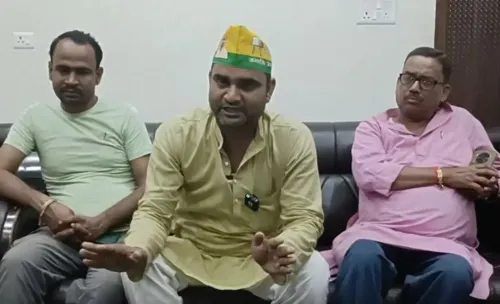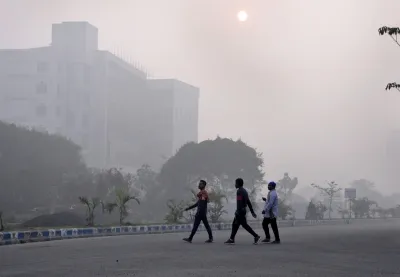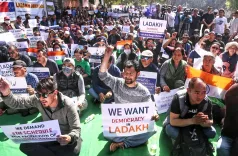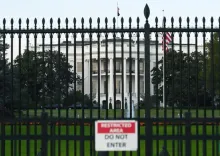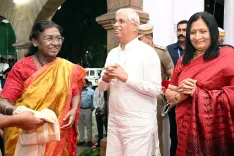How Did PM Modi Honor Syama Prasad Mookerjee's Legacy?
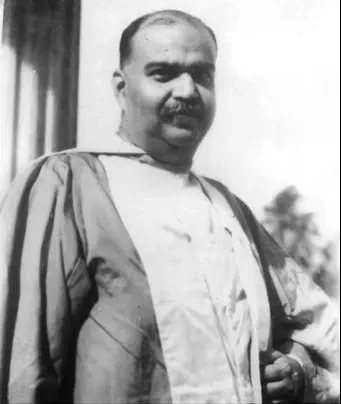
Synopsis
Key Takeaways
- Syama Prasad Mookerjee was a key figure in India's post-independence era.
- He opposed Article 370, advocating for Jammu and Kashmir's integration.
- His martyrdom day serves as a reminder of his sacrifices for national unity.
- The slogan 'Nahi Chalengey ek desh mein do Vidhan' reflects his vision for India.
- Mookerjee's legacy continues to inspire current and future generations.
New Delhi, June 23 (NationPress) Prime Minister Narendra Modi on Monday honored Syama Prasad Mookerjee, the visionary behind the Bharatiya Jana Sangh, on his death anniversary, praising his unmatched bravery and significant impact on the nation’s development.
Mookerjee, a distinguished nationalist leader and a pivotal figure in India’s post-independence era, is revered for his staunch opposition to Article 370 and his crucial role in the campaign to unify Jammu and Kashmir with the rest of India.
As stated on the official website of the Bharatiya Janata Party (BJP), he sacrificed his life “for the cause of integrating Kashmir with the rest of India.”
In a tribute shared on X, Prime Minister Modi remarked, “Paying my respects to Dr. Syama Prasad Mookerjee on his martyrdom day. He exhibited exceptional courage and commitment to maintain the integrity of our nation. His valuable contributions to nation-building will forever be honored.”
BJP National President and Union Minister J.P. Nadda also expressed his respects on social media.
“I extend my heartfelt tribute to the esteemed son of Mother India, the trailblazer of cultural nationalism, Dr. Shyama Prasad Mukherjee ji on his martyrdom day, who devoted himself entirely to the unity, integrity, and self-respect of India,” he posted.
Nadda continued, “Revered Dr. Shyama Prasad Ji fought ideologically and politically throughout his life to ensure that Jammu and Kashmir and West Bengal remained integral parts of India. He ignited the flame of cultural nationalism in the country with the inception of Jana Sangh.”
Union Minister Nitin Gadkari also commemorated Mookerjee on X, stating, “Tributes to the founder of Bharatiya Jana Sangh, revered Dr. Shyama Prasad Mukherjee on his martyrdom day. He sacrificed everything for the unity and integrity of our nation by renouncing power. His sacrifice will always be cherished.”
Uttar Pradesh Chief Minister Yogi Adityanath likewise remembered Mookerjee, calling him a beacon of inspiration.
“Tribute to the proclaimer of ‘Nahi Chalengey ek desh mein do Vidhan, do pradhan our do nissan’, the founder president of Bharatiya Jana Sangh, Dr. Shyama Prasad Mukherjee ji on his martyrdom day!” he shared on X.
“His dedication to the unity and integrity of our nation is a source of inspiration for all Indians,” he added.
Mookerjee had faced detention for 45 days for infringing Article 370, which required Indian citizens to secure a permit to enter Jammu and Kashmir.
His arrest and subsequent demise in custody on June 23, 1953, shocked the nation.
The permit system was later abolished, and the rallying cry that echoed throughout the country at that time was “Nahi Chalengey ek desh mein do Vidhan, do pradhan aur do nishan” (There will not be two constitutions, two prime ministers, and two flags in one country).
Mookerjee, who resorted to public protests outside Parliament to voice his dissent against Article 370, vehemently criticized it as the “Balkanization of India” and likened it to the “three-nation theory” of Sheikh Abdullah.
According to the BJP website, the Bharatiya Jana Sangh, along with the Hindu Mahasabha and the Ram Rajya Parishad, initiated a significant Satyagraha movement demanding the removal of the “harmful provisions” of Article 370.
In May 1953, Mookerjee tried to enter Jammu and Kashmir without a permit and was arrested on May 11. He died in custody on June 23, 1953.

